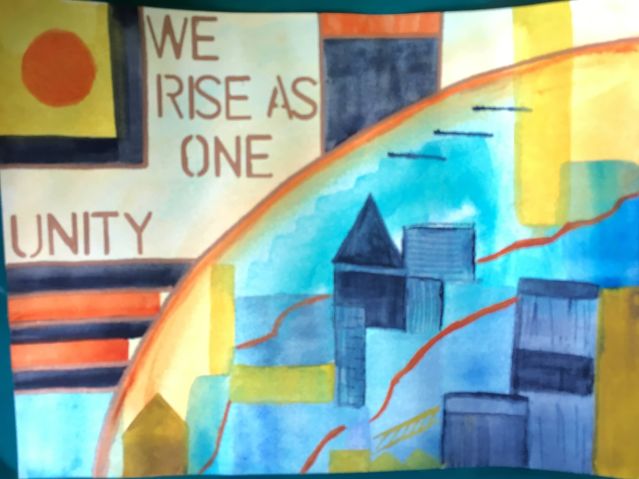Politics
Stop Fighting and Embrace the Power of Unity
"United we stand divided we fall" is more than just a 1970's lyric.
Posted July 8, 2024 Reviewed by Monica Vilhauer Ph.D.
Key points
- Unity gives people power over their oppressors.
- Unity is a universal human need.
- Unity doesn't require a majority to succeed.
- Unity means accepting differences.

Unity is a cross-cultural human need, and longing to belong feels like it is built into our DNA. It was definitely a survival mechanism for our cave-dwelling ancestors. Inclusion and acceptance into the tribe or clan made the difference between life and death. And, its ability to foster cooperation makes unity the basis for all civilization.
Today unity is as important as ever because it empowers small groups of people to create beneficial change or halt incursions into their liberty. With so much political disunity these days, I would like to offer an example of how unity can work to bring us together.
We Wanted a Safe Way to Cross the Creek
In 2001, I lived in an unincorporated county (with no city government) and had only a county commission to whom we could take our problems. Many people in the neighborhood were asking for a means to safely walk across a narrow bridge on a busy street with lots of motorized traffic. The bridge was so narrow that two cars could barely cross at the same time. As it was, a person walking their dog would have to wait until there was no traffic on one side, and then run across before the next car approached. It was less than 75 feet long, but that was still a long distance for many people to run. The bridge spanned a deep fast moving creek, which meant some form of pedestrian overpass was necessary.
One of the neighborhood associations made a formal request to the county commission to either widen the bridge enough to add a sidewalk or to install a separate pedestrian bridge. The county commission replied that it did not have the funds for such a project.
However, the county commissioner who represented our neighborhood came back to us with a solution that would cost the county nothing. He said he found a way to build a brand new bridge with sidewalks on both sides by using federal funding. Next he had the architecture firm he owned design the bridge to federal specifications. He then got the county commission and the federal agency with the funding to approve it. With that accomplished, he called a neighborhood meeting to show us the plans for the bridge we would be getting.
He Offered a Monster Sized Bridge
We were all shocked. In order to qualify for federal funding, his bridge would be over four football fields long, taller than a three-story building, four lanes wide, and designed for the impact of a high volume expressway. His proposed mega-bridge would have destroyed hundreds of old growth hardwood trees along with the ambiance of our residential neighborhood. It would also set the stage for turning our street, which provided a cut-through between two major roads, into a four-lane connector.
The neighborhood association president who made the request was inundated over the next three days with phone calls from irate neighbors who did not want the mega-bridge. So, she called the county commissioner and told him that we didn't want a big bridge, just something simple for pedestrians to get over the creek. He replied, “This bridge is a done deal. Unless you present us with 100,000 signatures on a petition, there's no way you can stop it.”
I Offered Unity Instead
Some of the leaders in our community resigned themselves to the inevitability of the big bridge, but I wasn’t willing to accept that. So I printed up flyers and put them in mail boxes in all the subdivisions within a half mile of the bridge. I even stapled some to the trees that were doomed to be chain sawed. Before long we had a movement. Over one hundred concerned neighbors wrote letters, phoned, faxed and emailed every member of the county commission, our representatives in the state legislature, and even the governor.
As a unified coalition we had enough power to stop the project without 100,000 signatures. Within a week, the county commissioner phoned the neighborhood association president and said, “The governor just called and asked me why I was trying to ram a mega-bridge down the throats of a neighborhood who didn’t want it. You win; the bridge has been cancelled. You can take your chances running across that narrow bridge because you’re not getting anything else.”
We created enough opposition to stop that project and save the beauty of our neighborhood. We succeeded because of unity. A few years later we voted to create our own city and take control of our tax money, which enabled us to finally get the pedestrian bridge we wanted.
Unity Doesn't Require a Majority
When people work together and gather their collective strength, it seems to make obstacles melt away. What once seemed impossible becomes achievable.
Unity can invoke political change as we have seen many times in history. Unity ended Apartheid in South Africa, the war in Vietnam, and systemic racial discrimination in the American south.
Unity doesn't require a majority to succeed, just a cooperative and determined minority. As an example look at the American Revolution which was far from a majority. At most, one-third of the colonists supported seceding from Britain. Only three percent actively fought the British. Ten percent provided material support to the soldiers. The remaining twenty percent preferred the revolutionaries but did nothing to sustain them.
We must be wary of those who will divide us. Corruption runs deep in our political system, and we need to exercise our critical thinking skills to recognize those who profit from our division. Will Durant, American philosopher and historian, warned, “The political machine triumphs because it is a united minority acting against a divided majority.”
Our political problems are best solved by coming together rather than by the division we have today. We need to remember how much we have in common. As I have written before, we all want: peace; to feel safe (free from fear); the basics of survival (clean water, good food, and a comfortable home); good health; prosperity (freedom to find happiness); friends; love; respect; self-confidence; and justice (everyone plays by the same rules).
Unity Is Not Conformity
Unity provides a vehicle for hope and connectedness. It is more than just accepting our differences; it means cherishing them because we can all benefit by learning new things, getting a different perspective, and expanding our consciousness. Embrace the power of unity — it may just save the world!




